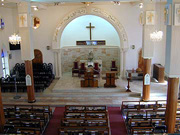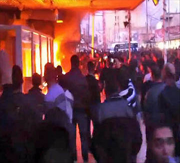 |
| (Photos courtesy Voice of the Martyrs USA) |
And that response is troublesome.
The plight of believers gets little attention on the global stage, leaving many Christians throughout North America unaware and therefore indifferent to what's going on in the body of Christ.
Mention persecution, and eyes glaze over. Silence continues because not enough church leaders are talking about it from the pulpit. Although Barna Research states the opposite, many North American church leaders and pastors say their flocks don't want to hear such negative and depressing things.
That's despite the following:
Al-Qaeda vows to slaughter Christians after the U.S. "liberates" Syria. Nigeria's Boko Haram has slaughtered 3,000 Christians since they began waging war. Egypt's Coptic Church is under fire. A Church official there says after the recent violence that destroyed over 72 churches, there are just 57 Christian churches in the entire country--down from more than 300 as recently as 2003.
The Barnabas Fund, a ministry to the persecuted Church, is airlifting Christians out of Sudan. So far, they've evacuated more than 5,000 Christians from northern Sudan. In Pakistan, believers are still trying to put their lives back together after 3,000 angry Muslims torched the Joseph Colony six months ago. That's only part of the Middle East and North Africa.
Asia is also on the list. North Korea is trying to erase Christians and has been atop the Open Doors World Watch List for 11 years as the world's worst persecutor of Christians. There's religicide going on in Burma and in parts of India.
And still, there's relative silence from North America. There are a few who have been speaking out as loudly as they can, but the overall impassive response to the worldwide persecuted church begs the question: Do we care?
Todd Nettleton, a spokesman for the Voice of the Martyrs USA says, "I think the question arises because as we look around the world, we see more than 60 countries where Christians face some form of harassment or persecution. And you look at the average response of the average American Christian which is basically, ‘Man, that's too bad.'"
A defensive response is also common. But here, too, Nettleton asks, "If we care, how is that being lived out?
How are we SHOWING that we care? Not based on clicking the 'Like' button on a Facebook page, but how are we showing that we care in action that is designed to produce a result or some easing of the suffering of our Christian brothers and sisters?"
He goes on to explain, "How we show we care is by being involved, by connecting with these Christians who are suffering. The first line of doing that really is knowing them: knowing their names, knowing their situations, knowing the countries that they live in so that we can pray effectively."
Nettleton is also quick to note that the issue has gotten more traction as awareness of social justice issues has risen. "More people know about the persecuted church now than did 15 or 20 years ago. I think the International Day of Prayer for the Persecuted Church--which is coming up in November--has been a significant part of making the American church aware of what's happening with persecuted Christians."
But there's still a long way to go, he concedes. "One of the challenges is: Americans are pretty home-focused. Our media covers things that are happening in America. In a 30-minute news program, we might get two minutes of what's going on around the world."
Another aspect is understanding the spiritual and biblical component of persecution. "These are not just statistics or people who live 10,000 miles from here. This is our family. These are our brothers and sisters."
Nettleton points out his own two brothers: if they were to be arrested and face the scenarios faced by Christians in Eritrea, for example, he would be making noise about their plight. The same should be true of the body of Christ. "I should be aware of what's happening with them. And when they're being persecuted and oppressed, I should be speaking out on their behalf. I should be letting people know that it is happening and doing whatever I can within my power to make it stop happening."
When believers put real faces, real names, and real places to the stories, the bigger picture becomes clearer. Nettleton explains, "It's not presented as this is what the Bible said was going to happen. Jesus said, 'If you follow Me, the world will hate you.' This is happening all around the world. Followers of Christ are being hated because they're followers of Jesus Christ."
Sometimes Americans avoid the discussion of the persecuted church because the news is discouraging. It's hard to hear and to feel helpless about changing anything. However, Nettleton breaks response down to its most simple elements. "You start by praying. You educate yourself. And then, whatever God lays on your heart as a response, you keep saying Yes to that and keep responding to that. You will find that you will enter into the ‘fellowship of suffering.'"
Then what? Nettleton explains that when people invest in taking on the troubles facing believers worldwide, they begin to understand the God who provokes such a response. As a result, "The persecuted church is strengthened because we can encourage them, we can stand with them, and we can be a voice for them. But we are strengthened, as well, because we see their faithfulness, and we see God's faithfulness to them. And our faith is encouraged and challenged, and we find that we grow spiritually, as well."


